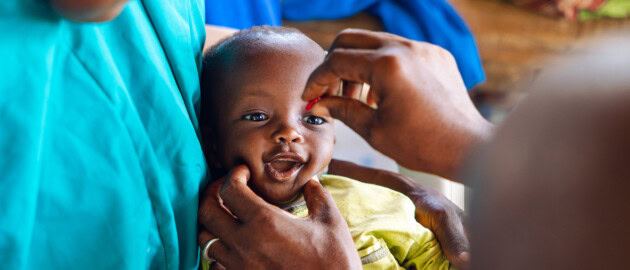Vitamin A
Strengthening health systems to deliver lifesaving vitamin A.

Mobilizing the global nutrition community to end malnutrition.
Millions face mounting global challenges that threaten their health and futures. Nutrition International leads with research, data and support, driving impactful, low-cost solutions to combat malnutrition worldwide.
Download the Annual Report PDF
Welcome to Nutrition International’s 2023 annual report.
Good nutrition is a cornerstone for human development and fundamental for a prosperous future. It fosters health, growth and cognitive function, empowers individuals to excel in school, thrive at work and contribute meaningfully to their communities.
In a world facing escalating global challenges and uncertainty, ensuring access to the right nutrition at the right time is crucial.
We are at a pivotal moment in the fight against malnutrition. With millions of lives still at risk from preventable nutrition deficiencies, Nutrition International is stepping up significantly by focusing its impact, connecting efforts across the globe and aligning partners and stakeholders around shared, timebound goals. Our team brings a rare blend of talent, expertise and experience to deliver essential nutrition interventions, bridge research gaps with compelling data, and advocate for increase prioritization and investment, solidifying our position as a global powerhouse of nutrition action.
children under five received two doses of vitamin A
people gained access to adequately iodized salt
people gained access to fortified foods
children with diarrhoea received the recommended course of zinc and oral rehydration salts
adolescents received nutrition education
adolescent girls consumed weekly iron and folic acid supplements
pregnant women received iron and folic acid supplements
newborns reached with a birth package intervention
Creating lasting change around the world.
In countries across Africa and Asia, we support programming from the national to the local level. By collaborating with governments and partners across various sectors, we work to implement policies, strengthen the knowledge base and deliver high-quality nutrition interventions. Explore some key highlights of our work from the last year:
In Bangladesh, ongoing political tensions and persistent inflation have posed significant challenges. Despite these difficulties, we continued to support the government and other partners to deliver micronutrient supplements, adequately fortified staple foods and improved health and nutrition services, with a particular focus on women, children and girls.
Ethiopia is facing multiple crises, including recurrent droughts and floods, ongoing conflicts and economic difficulties, all of which have led to more than 20 million people requiring food assistance. We are collaborating with the government and other partners to enhance primary care and nutrition services, particularly for adolescent girls, women and children.
In India, we continued to work alongside government ministries and partners to deliver essential nutrition interventions to address the country’s nutrition challenges and improve the health of the entire population, especially women, girls and children.
We work closely with the government to ensure that nutrition policies are properly enforced and support the development and implementation of nutrition interventions to improve the nutritional status of the population.
We are working with national and county governments to strengthen policies, support research and increase investments for nutrition programming. Our focus is on implementing low-cost, high-impact nutrition interventions to ensure that the population — particularly women, girls and children — have access to the nutrition they need.
In Nigeria, ongoing conflict, particularly in the northern regions, severely impacted food security and access to healthcare services. In collaboration with our partners, we continued to support the government to deliver quality nutrition programs to improve the health, development and productivity of the population.
Instability in regions such as Balochistan and Khyber Pakhtunkhwa led to delays in project implementation and impacted the delivery of health services, and access to healthcare facilities. Together with the government and global partners, we are working to improve access to micronutrients to enhance the health of women, girls and children.
We work with governments and partners to improve women’s and children’s nutrition in Senegal and the high-burden countries of the Sahel.
Guided by the country’s National Multisectoral Nutrition Action Plan, we support the government to improve policies and deliver quality programs to ensure the right nutrition gets to those in need particularly women, adolescent girls and children.
A global leader in nutrition.
Nutrition International stands at the forefront of the global fight against malnutrition, improving the health and wellbeing of people living in vulnerable situations in over 60 countries around the world, with a special focus on women, adolescent girls and children.
Our world class expertise, combined with more than three decades of hands-on experience working as an expert ally to governments, donors and implementers, allows us to maximize impact by delivering targeted nutrition interventions at scale. Whether it’s conducting cutting edge research, supporting policymakers, improving delivery or integrating nutrition into broader development programs, we make a difference, because nutrition is the difference.